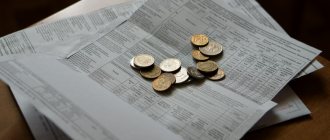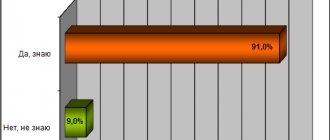The management company has changed, the bill comes from both. Who should I pay and who should I complain to?
Find out from what date the house is included in the license of the new management company - from that moment it begins to provide services. Until this time, you need to pay the previous company. If payments continue to come from two “bribery takers” at once, go to the prosecutor’s office. Or write a complaint (preferably a collective one - from five or more owners).
How to check the accuracy of the accrual?
There is a housing and communal services calculator on the FAS website: you can look at the standards for each region and calculate the amount you must pay. If the result differs from the figures in the payment slip, you have the right to demand justification or recalculation from the management company. In the worst case, you can file a complaint with the prosecutor's office.
I didn’t take meter readings for several months. Should there be a recalculation after I hand them in?
For the first three months, payments for housing and communal services are calculated according to the average, then - according to the standard. If you submitted the indicators and saw that you paid too much, then you are required to recalculate, and the updated receipt must be sent within the prescribed period. The excess will not be returned, but will be included in future payments.
Where to go if the management company refuses to recalculate?
First, get a reasoned refusal from the Criminal Code, go with it to Rospotrebnadzor and write a new application. The Housing Code reminds you: you can submit a request for recalculation within 30 days from the moment an incorrect calculation is discovered. If this deadline is violated, the refusal to recalculate will be legal and cannot be challenged.
How many numbers should be included in the receipt for electricity and heating?
Depending on the meter, gigacalories and kilowatts (which must be entered on the receipt) are separated from fractions (which can be ignored) by a dot, comma, or frame. Enter everything up to the separator.
How are penalties calculated?
The amount of the penalty depends on the delay: from the 31st to the 90th day of payment, the penalty will be 1/300 of the Central Bank refinancing rate for each day of delay, and from the 91st day the penalty will increase to 1/130 of the rate. From July 29 to September 6, 2020, the rate is 7.25% per annum. That is, if you owe the management company a conditional 6 thousand rubles, you will be credited 1.45 rubles every day. For three months of delay, including the preferential one, 87 rubles will be accumulated.
How to reduce interest on debt?
There are general and specific grounds for writing off penalties, both partially and in full. General ones provide the legal opportunity to cancel the payment of not only the penalty, but the full amount of the utility debt. These include the expiration of the limitation period for an obligation, the death or bankruptcy of the debtor, and the impossibility of enforcement of a court decision by bailiffs. Among the private ones are payment in installments, regression of payment, statement of special circumstances (long absence, illness, etc.), reduction of the amount of penalties due to the disproportion of the penalty to the principal debt in accordance with Art. 333 Civil Code. If the debt is partially repaid for a certain period, then penalties are not accrued for this time (for example, the debtor did not pay from January to April, but decided to pay for May and June). The amount decreases, since the amount of the penalty after July is recalculated at a different interest rate.
Do I have to pay the debts of the previous homeowner?
The debt does not belong to the apartment, but to its owner. Therefore, the new owner should not pay, unless, of course, this is provided for in a separate clause of the purchase and sale agreement. The law clearly states this. At the same time, according to the Housing Code, debt on contributions for major repairs must be paid by the current owner, regardless of when and under which owner it arose. Therefore, it is important to check the debt before concluding a purchase and sale transaction. Buyers often neglect to check, assuming that repair fees are regulated by the code, which states that the new owner is not responsible for the debts of the old one. Alas, this only applies to utilities.
No one is registered or lives in the apartment. What to pay for and how much?
Fees for housing maintenance, current and major repairs are mandatory - they depend on the area of the apartment, and not on the number of registered apartments. You will also have to pay for utilities. For heating (if you do not have a personal meter for each battery), the payment will be calculated based, again, on the area of the living space. If the apartment does not have meters, the payment is calculated depending on the number of owners.
I am against the service that the house council voted for. Do I have to pay?
Everything here is like in presidential elections: the one who gets the most votes wins, and you have to play by the established rules. According to the law, the decision made by the majority also applies to those who did not vote at all. There is only one loophole: try to prove that the general meeting was held with violations and violates, in particular, your rights and interests.
What to do if there is an error in the housing and communal services receipt in favor of the management company
Reasons for inflated payments in receipts for which recalculation can be requested:
- tariff increases;
- payment for work of non-existent specialists;
- presence of unperformed services in the receipt;
- supplementing payments with debts of careless tenants;
- failure of the management company to fulfill its obligations to maintain the house.
If an error is discovered in which the amounts of regular payments are higher than required, you must contact the management office with an application to recalculate the amount of utility fees. A conscientious company that is not interested in scandals and litigation will recalculate at the request of the applicant. The most common reason for “extra” collections from payers is the attribution of other people’s debts on receipts.
The fact is that among renters there are asocial citizens who do not consider it their duty to pay utility bills. And, instead of fighting such individuals and their debts, management companies quietly scatter the amounts of debt on the receipts of bona fide payers.
Important! You should not pay other people's debts; the problem of unscrupulous users lies on the shoulders of management companies, not honest payers.
Unfortunately, some companies refuse to recalculate, citing the correctness of the charges indicated on the receipt. In this case, you should write an official request, fill out an inventory and send both documents by registered mail to the Criminal Code. If there is no reaction to the registered letter, then there is only one way out - going to court.
It is advisable to file a claim for legal proceedings if errors in housing and communal services receipts were made repeatedly, and the payment amount was unjustifiably inflated.
Refuse services you don't need
Such services include concierge services, security, video surveillance, insurance, as well as landscaping and landscaping of the local area. However, if paying for home insurance is a strictly individual decision, then the decision to pay for the concierge, security, and other things is made by the owners at a general meeting.
If the meeting decides to pay for this, those who voted “against” lose their votes and are obliged to pay for the services on an equal basis with everyone else.
In this case, you can only check whether the meeting was held correctly and whether a certain procedure established by housing legislation was followed.








